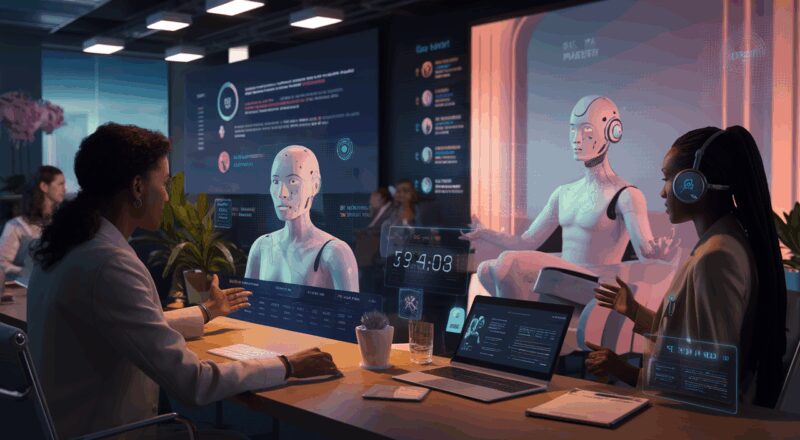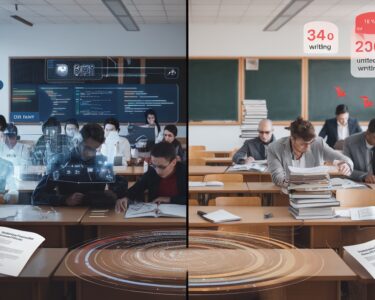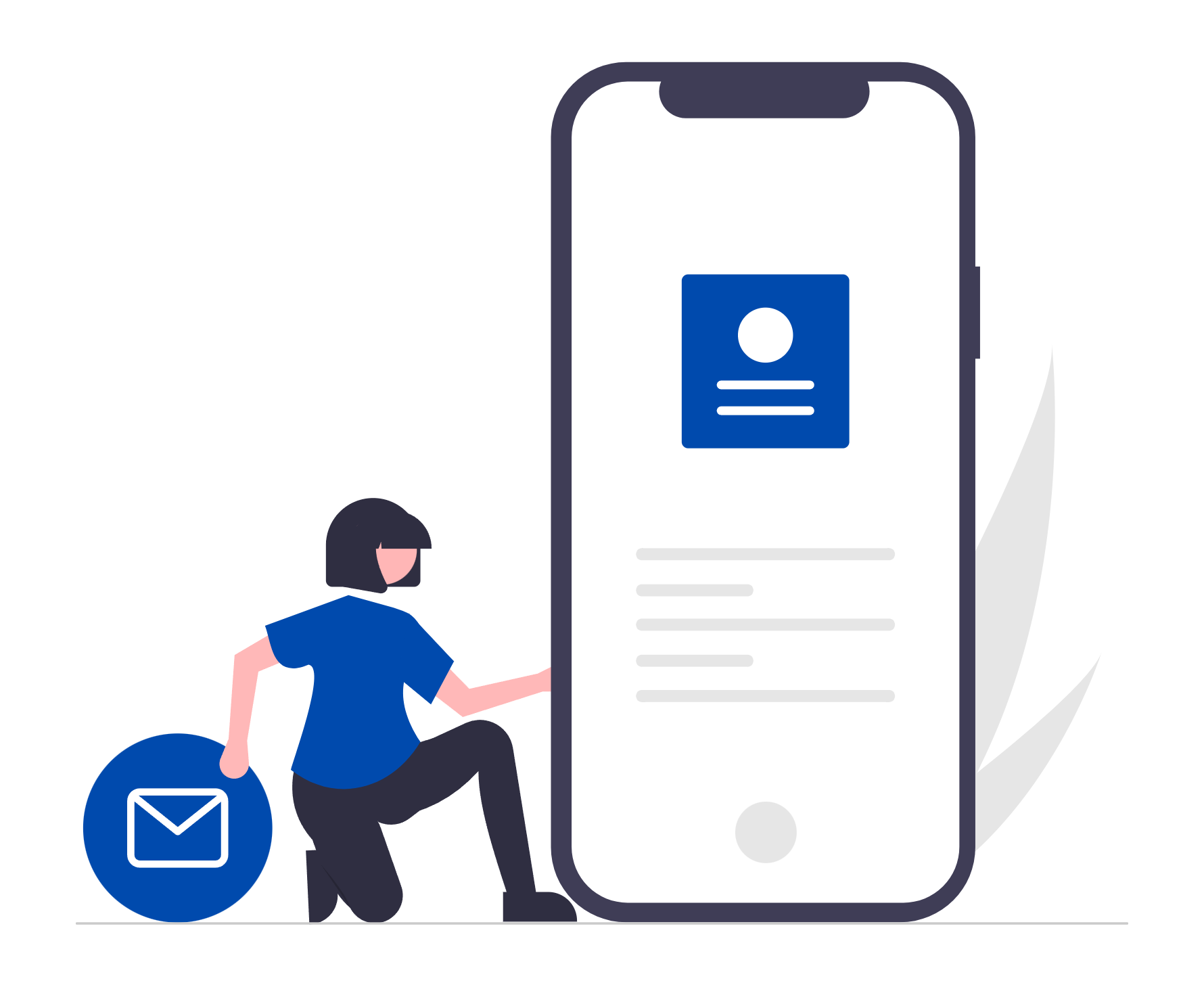Using Ai To Rehearse Conversations aids in communication training by providing judgment-free spaces where users can repeatedly practice difficult dialogues without real-world consequences.
Key Takeaways
- Communication anxiety affects 77% of people, and poor workplace communication costs companies an average of $62.4M annually.
- AI conversation practice tools analyze vocal delivery, speaking pace, and body language to give comprehensive feedback for improvement.
- Flexible practice options allow users to pause, restart, and try different approaches during AI-enhanced sessions in a low-pressure environment.
- Customizable technology is useful for various scenarios such as job interviews, sales pitches, and challenging personal conversations.
- Limitations exist in areas such as reading non-verbal cues and creating true emotional connections with users.
I’ve found AI conversation partners transform how people prepare for important discussions. These digital practice tools allow users to fail privately, experiment widely, and refine their communication skills through precise, data-driven feedback.
How AI Enhances Communication Training
Advanced Analysis Capabilities
The technology examines speech patterns, word choice, and even facial expressions to provide specific improvement suggestions. Gone are the days of relying solely on a friend’s vague feedback or mirror practice — these platforms offer detailed analysis previously available only through expensive coaching.
Scenario Customization
The ability to customize scenarios makes these tools incredibly practical. I’ve seen users prepare for everything from salary negotiations to difficult family conversations using the same platform, adjusting variables to match their specific needs.
Applications in Professional Settings
For professionals handling high-pressure communications regularly, these tools create a safe training ground. Sales representatives can test different pitches, customer service agents can practice handling complaints, and job seekers can sharpen interview responses without risking real-world opportunities.
Limitations and Recommendations
Understanding AI Boundaries
Despite their advantages, current AI conversation partners can’t fully replicate human nuance. They miss subtle emotional cues and cultural contexts that shape authentic conversations.
Suggested Use
I recommend using these tools as supplements to, not replacements for, practice with actual people.
Practicing High-Stakes Conversations with AI: A Game-Changer for Communication
Using AI to Rehearse Conversations: Understanding the Impact
Communication anxiety affects 77% of people, making it one of the most common social challenges we face. The stakes are particularly high in professional settings, where poor workplace communication leads to staggering losses – averaging $62.4M annually for companies.
I’ve found that AI conversation practice tools offer a revolutionary approach to building confidence and competence in communication. These platforms create judgment-free zones where you can practice difficult conversations repeatedly without the fear of real-world consequences.
How AI Transforms Conversation Practice
Using AI to rehearse conversations has become more sophisticated thanks to Natural Language Processing. This technology enables AI to understand context, tone, and subtle nuances in communication, making practice sessions feel remarkably authentic.
Here’s what makes AI conversation practice particularly effective:
- Instant feedback on your communication style and word choice
- Ability to pause, restart, and try different approaches
- Customizable scenarios for specific situations
- Progress tracking across multiple practice sessions
The beauty of AI-powered conversation simulation lies in its adaptability. Whether you’re preparing for a job interview, practicing difficult client conversations, or working on personal relationships, AI can adjust its responses to match your needs.
I’ve seen how using AI as a conversation partner helps reduce anxiety through repeated exposure to challenging scenarios. Each practice session builds confidence, refines communication skills, and provides valuable insights into effective interaction strategies.
The technology’s ability to provide consistent, objective feedback makes it an invaluable tool for anyone looking to improve their communication skills. By using AI to rehearse conversations regularly, you’ll develop stronger communication habits and feel more prepared for real-world interactions.
Transform Your Communication Skills Through AI-Powered Practice
Using AI to Rehearse Conversations: A Complete Analysis
I’ve found that mastering communication isn’t just about what you say – it’s about how you say it. Through AI-powered conversation practice, you’ll get instant feedback on crucial elements that many people miss.
Modern AI platforms analyze your vocal delivery with incredible detail. They track your speaking pace, helping you find the sweet spot between too fast and too slow. They also monitor pitch variations, ensuring you’re not speaking in a monotone that might put listeners to sleep. Volume control and those pesky filler words like “um” and “uh” don’t escape the AI’s attention either.
Advanced Features for Using AI to Rehearse Conversations
The technology goes beyond just voice analysis. By connecting to your webcam, AI tools can now assess your body language and eye contact patterns. I’ve seen how platforms like VirtualSpeech and Poised provide real-time feedback on everything from facial expressions to posture.
Here are the key areas where AI coaching makes a difference:
- Word choice optimization and clarity improvements
- Sentiment analysis for emotional intelligence
- Progress tracking with personalized growth metrics
- Custom scenarios for different conversation types
- Real-time pronunciation corrections
The AI conversation simulator adapts to your specific needs, whether you’re preparing for job interviews, sales pitches, or challenging personal discussions. Tools like Google Interview Warmup specifically focus on professional scenarios, while others like Orai help with general public speaking skills.
For those looking to practice more personal interactions, AI conversation partners can help you rehearse difficult discussions with family members or friends. These platforms remember your previous sessions and adjust their responses based on your progress.
Through consistent practice with these AI tools, you’ll notice improvements in your communication style. The platforms track your development over time, showing you where you’ve improved and what still needs work. They can even customize their feedback based on your industry, role, or specific communication goals.
Current Limitations and Future Developments in Using AI to Rehearse Conversations
Technical and Emotional Boundaries When Using AI to Rehearse Conversations
I’ve found that while AI conversation practice tools offer valuable training opportunities, they still face significant limitations. The technology can’t fully replicate genuine human empathy or pick up on subtle emotional cues that make real conversations unique. When practicing therapeutic conversations with AI, users might miss out on the nuanced emotional responses that come naturally in human interactions.
Here are the key limitations I’ve identified:
- Limited ability to read non-verbal cues
- Inability to form genuine emotional connections
- Potential for misinterpreting complex emotional states
- Restricted capacity for spontaneous reactions
Privacy remains a serious concern, especially when sharing voice data during conversation practice. While AI relationship simulators can help build confidence, users need to be careful about the personal information they share during these sessions.
Exciting Developments on the Horizon
The future of using AI to rehearse conversations looks promising with several groundbreaking developments. Virtual and augmented reality integration is creating more immersive practice environments, making conversations feel more realistic and engaging. I’ve seen how AI conversation partners are becoming more sophisticated, offering increasingly natural responses.
The technology is advancing in these key areas:
- Enhanced emotional intelligence detection through facial recognition
- Better context awareness in conversations
- Improved natural language processing capabilities
- Seamless integration with professional development platforms
These improvements are making AI conversation practice more effective for professional training, personal development, and therapeutic applications. The technology’s integration with HR systems and learning management platforms is opening new possibilities for standardized training and assessment.
While current AI can’t match human interaction completely, it’s becoming an increasingly valuable tool for conversation practice. The key lies in using it as a supplement to, rather than a replacement for, real human interaction.
Practicing difficult discussions can feel less intimidating when you explore tools that simulate real dialogue, like the one described in this unsettling experience [here on Reddit].
Sources:
David Grossman Report – The Cost of Poor Communications
National Association of Colleges and Employers (NACE) Job Outlook Survey
Chapman University Survey on American Fears
Yoodli – www.yoodli.ai
Poised – www.poised.com
Orai – www.orai.com
VirtualSpeech – www.virtualspeech.com
Google – grow.google/interview-warmup







